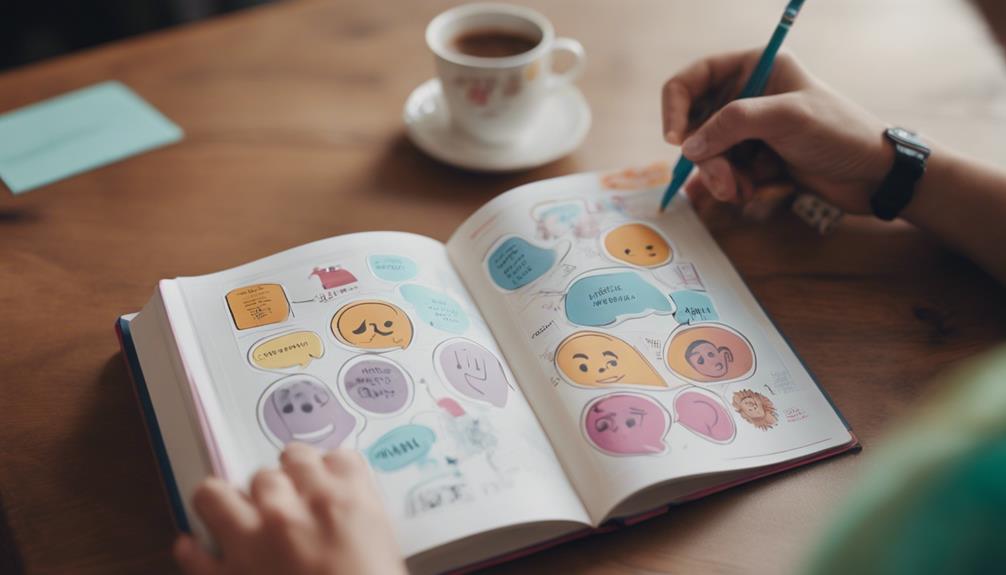Imagine using an activity book filled with colorful illustrations and engaging exercises to learn a new language. You might be surprised to discover how these interactive tools can transform your language learning journey.
By incorporating fun activities and games into your study routine, you can make mastering a new language feel like an enjoyable adventure. But what makes these activity books so effective in helping you achieve language fluency?
Let's explore the unique benefits they offer and how they can enhance your learning experience in unexpected ways.
Key Takeaways
- Activity books enhance language learning outcomes for children and adults.
- Interactive activities in activity books stimulate the brain and boost confidence.
- Role-playing scenarios and group challenges improve language skills effectively.
- Incorporating games and creative writing prompts make language learning enjoyable and effective.
Benefits of Using Activity Books

Using activity books has been shown to significantly enhance language learning outcomes in both children and adults. Cognitive benefits are a key advantage of utilizing activity books in language learning. By engaging in activities such as puzzles, word searches, and matching games, individuals can improve their cognitive functions like memory, problem-solving, and critical thinking. These activities stimulate the brain and encourage learners to think creatively in the target language, leading to a deeper understanding and retention of linguistic concepts.
Additionally, activity books serve as motivational tools to keep learners engaged and enthusiastic about language learning. The interactive nature of these books allows individuals to see their progress, which can boost confidence and self-esteem. Moreover, completing tasks and seeing tangible results can provide a sense of accomplishment, reinforcing the desire to continue learning. By incorporating fun and interactive elements, activity books make the language learning journey enjoyable and rewarding, ultimately enhancing overall proficiency in the language.
🌊 Discover Endless Fun with Beachcomber Press Puzzle Books! 🌊
Elevate your puzzle game with our captivating collection on Amazon.
Perfect for all ages, our books are packed with unique
challenges that promise hours of entertainment.
Diverse puzzles for every skill level High-quality, engaging content
Interactive Language Learning Activities
Engaging in interactive language learning activities enhances cognitive functions and promotes retention through stimulating tasks and games. Role-playing scenarios are a particularly effective way to immerse yourself in real-life language situations. By embodying different characters, you not only practice vocabulary and grammar but also develop conversational skills and cultural understanding.
Group challenges provide a dynamic environment where you can collaborate with others to solve language-related tasks. This fosters teamwork, communication, and the sharing of knowledge, all of which are essential elements in language acquisition.
In role-playing scenarios, you can simulate everyday interactions like ordering food at a restaurant or asking for directions, which helps you feel more confident when facing similar situations in the real world. Group challenges, on the other hand, offer a platform for friendly competition and peer support, making language learning a social and engaging experience. By actively participating in these interactive activities, you not only enhance your linguistic abilities but also enjoy the process of mastering a new language.
Engaging Exercises for Language Mastery

Immersing yourself in a variety of engaging exercises is essential for mastering a new language, enhancing both linguistic proficiency and cultural understanding. Role playing scenarios offer an interactive way to practice language skills in real-life situations. By assuming different roles and engaging in conversations, you can improve your vocabulary, grammar, and conversational abilities.
Outdoor immersion experiences provide a unique opportunity to apply language learning in authentic settings. Whether it's exploring a local market, interacting with native speakers, or participating in cultural events, being immersed in the language and culture accelerates your learning process.
Research shows that incorporating role playing scenarios and outdoor immersion experiences into language learning can significantly boost proficiency levels. These exercises not only help you practice language skills but also deepen your understanding of cultural nuances and social interactions. By actively engaging in these exercises, you won't only master the language but also develop a more profound connection to the culture you're learning.
Incorporating Games Into Language Learning
To enhance language learning further, exploring the incorporation of games as a complementary method offers a dynamic approach that can boost engagement and retention of linguistic skills. When incorporating games into your language learning routine, consider the following:
- Role Playing Games: Engaging in role-playing games allows you to immerse yourself in real-life scenarios where you must communicate in the target language. This interactive experience helps improve conversational skills and enhances vocabulary acquisition.
- Memory Challenge: Memory-based games like matching vocabulary cards or playing memory recall games can strengthen your ability to remember new words and phrases. These games aren't only fun but also effective in cementing language knowledge in your long-term memory.
- Word Puzzles and Crosswords: Solving word puzzles and crosswords challenges your language skills by requiring you to think critically about vocabulary, grammar, and context. These games provide a playful way to expand your language proficiency while keeping you engaged and motivated.
Creative Writing Prompts for Language Practice

Exploring a variety of creative writing prompts can significantly enhance your language practice and proficiency. Engaging in activities like story starters and dialogue practice can help you improve your vocabulary, grammar, and overall writing skills. Here are some creative writing prompts to get you started:
| Story Starters | Dialogue Practice |
|---|---|
| 1. You wake up one morning to find yourself in a different country. | 1. A conversation between two strangers meeting at a cafe. |
| 2. Write about a character who discovers a hidden talent. | 2. An argument between two friends about a misunderstanding. |
| 3. Describe a futuristic world where humans live underwater. | 3. A dialogue between a teacher and a student discussing a challenging assignment. |
| 4. Begin a story with the sentence: "The old house at the end of the street was haunted." | 4. A phone conversation between a parent and a child making plans for the weekend. |
| 5. Write about a magical object that grants wishes but comes with a price. | 5. Roleplay a job interview scenario between an employer and a potential candidate. |
Vocabulary Building Through Fun Activities
How can engaging in vocabulary-building activities through fun and interactive methods enhance your language learning experience?
When it comes to expanding your vocabulary in a new language, incorporating engaging activities can make the process more enjoyable and effective. Here are three ways you can boost your vocabulary through fun activities:
- Flashcard games:
Utilize flashcards to make learning new words more interactive. Create flashcards with the foreign word on one side and the translation on the other. Then, play games like memory matching or vocabulary races with a partner to reinforce your word retention.
- Word puzzles:
Solve crossword puzzles, word searches, or anagrams in the target language. These activities not only introduce you to new vocabulary but also challenge your problem-solving skills in a language-learning context.
- Interactive online quizzes:
Explore language learning websites or apps that offer interactive quizzes tailored to vocabulary building. These quizzes can test your knowledge, provide instant feedback, and keep you motivated to learn more words.
🌊 Discover Endless Fun with Beachcomber Press Puzzle Books! 🌊
Elevate your puzzle game with our captivating collection on Amazon.
Perfect for all ages, our books are packed with unique
challenges that promise hours of entertainment.
Diverse puzzles for every skill level High-quality, engaging content
Enhancing Listening and Speaking Skills

Engaging in interactive language exercises can significantly enhance your listening and speaking skills. Role-playing scenarios provide a dynamic way to practice speaking while also improving listening comprehension. By immersing yourself in different roles, you can simulate real-life conversations and enhance your ability to understand and respond in a new language. Pronunciation practice is another vital aspect of improving speaking skills. Activity books often include exercises that focus on correct pronunciation, helping you to articulate sounds accurately and communicate more effectively.
To further illustrate the importance of role-playing scenarios and pronunciation practice, the table below outlines their benefits in enhancing listening and speaking skills:
| Aspect | Benefits | Examples |
|---|---|---|
| Role-playing Scenarios | Enhances conversational skills, improves fluency | Simulating ordering food in a restaurant |
| Pronunciation Practice | Refines speech clarity, helps mimic native speakers' accents | Repeating tongue twisters for accuracy |
Incorporating these activities into your language learning routine can lead to significant improvements in your ability to listen and speak confidently in a new language.
Cultural Insights Through Activity Books
What cultural insights can be gained through engaging with activity books designed for language learning? Activity books offer a unique platform for cultural exploration and language immersion. By interacting with the content, you can uncover various aspects of a language's culture, enhancing your understanding and appreciation of it.
Cultural Insights Through Activity Books:
- Traditional Practices: Activity books often include cultural references like traditional celebrations, customs, and rituals. By engaging with these topics, you can gain insights into the values and beliefs held by native speakers of the language.
- Everyday Life Scenarios: Through scenarios presented in activity books, you can learn about the typical daily routines, interactions, and social norms prevalent in the target culture. This exposure helps you navigate real-life situations more effectively.
- Cultural Nuances in Language: Activity books often incorporate idioms, proverbs, and colloquial phrases specific to a culture. By mastering these linguistic nuances, you not only improve your language skills but also gain a deeper understanding of the cultural context in which they're used.
Tracking Progress and Goal Setting
Tracking your progress and setting goals are essential components of effective language learning strategies. Setting clear and achievable goals helps you stay motivated and focused, while tracking your progress allows you to see how far you've come and what areas need improvement.
To help you better understand the importance of setting goals and tracking progress in language learning, let's look at the table below:
| Goal Setting | Tracking Progress |
|---|---|
| Helps create a clear roadmap for your language learning journey | Allows you to measure your advancement over time |
| Motivates you to stay committed and work towards specific objectives | Identifies areas where you excel and areas that require more attention |
| Enables you to break down your language learning into manageable tasks | Helps you adjust your learning strategies based on your performance |
| Encourages you to celebrate small victories along the way | Provides insights into your strengths and weaknesses |
| Allows you to set deadlines and milestones for achieving fluency | Guides you in setting new goals based on your progress |
Making Language Learning Enjoyable
To enhance your language learning experience, it's crucial to find ways to make the process enjoyable and engaging. When tackling language challenges, incorporating fun elements can significantly boost your motivation and retention.
Here are three ways to make language learning enjoyable:
- Gamify Your Learning: Turn language practice into a game by using language learning apps that offer gamified experiences. These apps often include challenges, rewards, and interactive activities that make learning feel like play rather than work.
- Incorporate Interactive Activities: Engage in language learning through play by participating in language exchange meetups, language-themed board games, or interactive online communities. These activities provide a social and enjoyable aspect to learning, making it feel less like a chore.
- Use Creative Resources: Explore creative resources such as language activity books, podcasts, or language learning websites that offer engaging content like storytelling, music, or puzzles. These resources can make the learning process more enjoyable and diverse, keeping you motivated and interested in mastering a new language.
Frequently Asked Questions
Can Activity Books Help With Learning More Than One Language at a Time?
Yes, activity books can enhance language learning by utilizing multitasking benefits to reduce cognitive load. Simultaneous learning of multiple languages aids in language acquisition. Incorporating diverse activities in one book can optimize your linguistic development effectively.
🌊 Discover Endless Fun with Beachcomber Press Puzzle Books! 🌊
Elevate your puzzle game with our captivating collection on Amazon.
Perfect for all ages, our books are packed with unique
challenges that promise hours of entertainment.
Diverse puzzles for every skill level High-quality, engaging content
Are There Specific Activity Books Tailored for Different Age Groups or Language Proficiency Levels?
Looking for activity books that match your age and language skills? Seek out titles that are age appropriate and proficiency specific. Embrace a multilingual approach with resources tailored to your needs for effective learning.
How Can Parents or Teachers Incorporate Activity Books Into a Structured Language Learning Curriculum?
To incorporate activity books into a structured language learning curriculum, engage in interactive games, encourage parent involvement, utilize creative exercises, and seamlessly integrate them into the classroom. This approach fosters a dynamic and effective learning environment.
Are There Any Resources or Online Platforms That Complement the Use of Activity Books for Language Learning?
Looking to enhance your language learning journey? Dive into online resources, language apps, interactive websites, language games, or connect with language tutors and exchange programs. These tools will complement your activity books seamlessly.
Can Activity Books Be Used as a Supplement to Traditional Language Learning Methods or as a Standalone Resource?
You can definitely use activity books as a supplement to traditional language learning methods. They offer interactive exercises, vocabulary games, creative challenges, and conversation practice, making them a versatile and engaging resource for mastering a new language.
Conclusion
In conclusion, activity books offer a fun and effective way to master a new language. By engaging in interactive exercises, games, and creative writing prompts, language learners can enhance their skills in listening, speaking, and cultural understanding.
Tracking progress and setting goals can help individuals stay motivated and focused on their language learning journey. For example, Sarah used activity books to practice Spanish every day for a month and saw significant improvement in her conversational skills.
Enjoy the process and watch your language proficiency grow!

